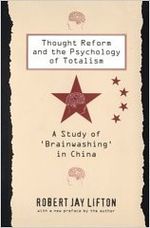- Thought Reform and the Psychology of Totalism
-
Thought Reform and the Psychology of Totalism 
Book cover, 1989 editionAuthor(s) Robert Jay Lifton, M.D. Translator Richard Jaffe (Chinese) Cover artist Shelley Gruendler Country United States Language English Subject(s) Psychology
Brainwashing
Mind controlGenre(s) Non-fiction Publisher University of North Carolina Press Publication date July 1989 (reprint) Media type Paperback Pages 524 ISBN 0-8078-4253-2 OCLC Number 19388265 Dewey Decimal 153.8/53/0951 19 LC Classification BF633 .L5 1989 Followed by Death in Life: Survivors of Hiroshima Thought Reform and the Psychology of Totalism: A Study of "Brainwashing" in China is a psychology non-fiction book on brainwashing and mind control by Robert Jay Lifton. The book was published in multiple editions, in 1956 (hardcover)[dubious ], 1961, 1962 (hardcover), 1963 (paperback), and 1989 (paperback). The 1989 reprint edition was published by University of North Carolina Press. Lifton is a Distinguished Professor of Psychiatry at the John Jay College of Criminal Justice, City University of New York.
Contents
Main points
In the book, Lifton outlines the "Eight Criteria for Thought Reform":
- Milieu Control. This involves the control of information and communication both within the environment and, ultimately, within the individual, resulting in a significant degree of isolation from society at large.
- Mystical Manipulation. The manipulation of experiences that appears spontaneous but is, in fact, planned and orchestrated by the group or its leaders in order to demonstrate divine authority, spiritual advancement, or some exceptional talent or insight that sets the leader and/or group apart from humanity, and that allows reinterpretation of historical events, scripture, and other experiences.
- Demand for Purity. The world is viewed as black and white and the members are constantly exhorted to conform to the ideology of the group and strive for perfection. The induction of guilt and/or shame is a powerful control device used here.
- Confession. Sins, as defined by the group, are to be confessed either to a personal monitor or publicly to the group. There is no confidentiality; members' "sins," "attitudes," and "faults" are discussed and exploited by the leaders.
- Sacred Science. The group's doctrine or ideology is considered to be the ultimate Truth, beyond all questioning or dispute. Truth is not to be found outside the group. The leader, as the spokesperson for God or for all humanity, is likewise above criticism.
- Loading the Language. The group interprets or uses words and phrases in new ways so that often the outside world does not understand. This jargon consists of thought-terminating clichés, which serve to alter members' thought processes to conform to the group's way of thinking.
- Doctrine over person. Member's personal experiences are subordinated to the sacred science and any contrary experiences must be denied or reinterpreted to fit the ideology of the group.
- Dispensing of existence. The group has the prerogative to decide who has the right to exist and who does not. This is usually not literal but means that those in the outside world are not saved, unenlightened, unconscious and they must be converted to the group's ideology. If they do not join the group or are critical of the group, then they must be rejected by the members. Thus, the outside world loses all credibility. In conjunction, should any member leave the group, he or she must be rejected also.[1]
Thought-terminating cliché
Thought Reform and the Psychology of Totalism popularized the term "thought-terminating cliché". A thought-terminating cliché is a commonly used phrase, sometimes passing as folk wisdom, used to quell cognitive dissonance. Though the phrase in and of itself may be valid in certain contexts, its application as a means of dismissing dissent or justifying fallacious logic is what makes it thought-terminating.
The language of the totalist environment is characterized by the thought-terminating cliché. The most far-reaching and complex of human problems are compressed into brief, highly reductive, definitive-sounding phrases, easily memorized and easily expressed. These become the start and finish of any ideological analysis.
In George Orwell’s novel Nineteen Eighty-Four, the fictional constructed language Newspeak is designed to reduce language entirely to a set of thought-terminating clichés. Aldous Huxley’s Brave New World society uses thought-terminating clichés in a more conventional manner, most notably in regard to the drug soma as well as modified versions of real-life platitudes, such as, “A doctor a day keeps the jim-jams away.”
See also
References
- ^ Dr. Robert J. Lifton's Eight Criteria for Thought Reform, Lifton, 1989 edition.
- ^ Lifton, Robert J. (1989). Thought reform and the psychology of totalism: A study of brainwashing in China. UNC Press. p. 429. ISBN 9780807842539. http://books.google.com/books?id=FU_ifHrIIg0C&pg=PA429&dq=%22Thought-terminating+clich%C3%A9%22+totalism&ei=36VxS9WhBZLKMObN7PkF&cd=1#v=onepage&q=&f=false.
- ^ The Watchman Expositor: The use of Mind Control in Religious Cults (Part Two)
External links
- Lifton's Thought Reform, describes Lifton's eight methods
Categories:- Psychology books
- Books about mind control
- 1956 books
- 1961 books
- 1962 books
- 1963 books
- 1989 books
Wikimedia Foundation. 2010.
